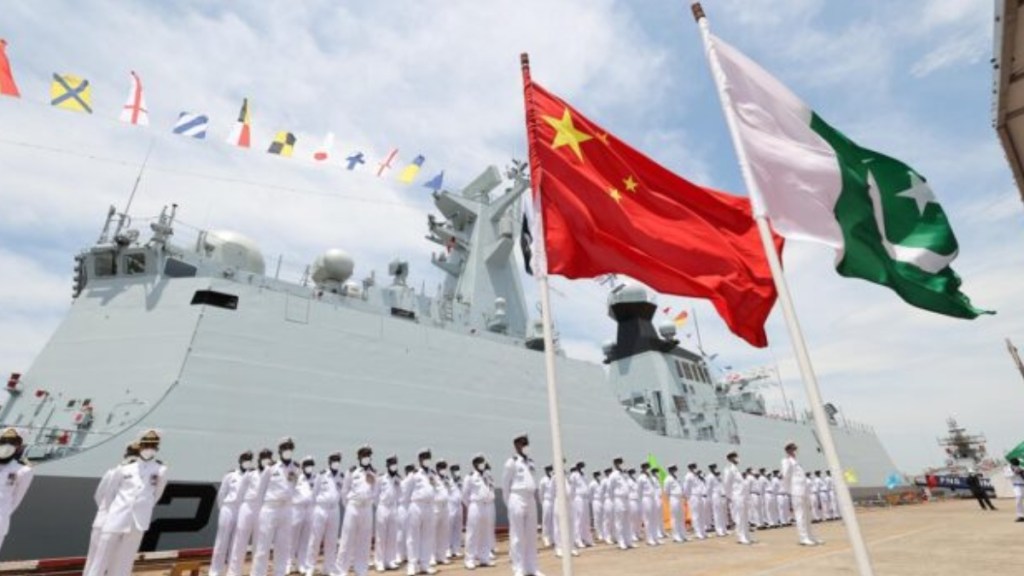By Manan Bhatt (Retd)
Even as Pakistan grapples with one of the worst economic crises in its history, it is set to host the AMAN-25 multinational naval exercise in 2025. The biennial event, branded under the slogan “Together for Peace,” is meant to signal Pakistan’s commitment to maritime security and international cooperation. However, the irony is unmistakable—how does a country teetering on the brink of financial collapse find the resources to organize a large-scale naval exercise?
A Crumbling Economy and Military Expenditure
Pakistan’s economic woes are no secret. The country remains heavily dependent on IMF bailouts, Chinese loans, and financial aid from Gulf nations. Inflation has remained persistently high, foreign reserves are critically low, and the rupee continues to depreciate. With industrial production stagnating and an overwhelming debt burden, Pakistan is struggling to provide even basic governance and public services.
Despite this, the Pakistan Navy continues to push for high-profile military engagements like AMAN-25, prioritizing prestige over pragmatism. The naval exercise, first launched in 2007, is seen as Pakistan’s attempt to portray itself as a key player in maritime security. However, the costs associated with hosting such an event raise serious questions about the government’s priorities.
Symbolism over Substance
Pakistan claims that AMAN-25 is part of its commitment to regional and global maritime security. Previous editions have seen participation from over 50 countries, including China, the U.S., Russia, and Turkey—a rare diplomatic feat for Pakistan, given its growing isolation on the world stage.
Yet, beyond the symbolism, the reality remains stark: Pakistan’s own maritime security infrastructure is underfunded and underdeveloped. The Pakistan Navy lacks modern indigenous capabilities, relies heavily on Chinese assistance, and struggles with operational readiness. Moreover, the country’s naval strategy remains unclear, especially as it faces little direct maritime threat compared to its extensive land-based challenges with India and Afghanistan.
Geopolitical Optics: Who Gains?
With AMAN-25, Pakistan seeks to project an image of international relevance. The exercise allows Islamabad to engage with countries that might otherwise be wary of deeper military ties due to its unstable political and economic situation.
For China, AMAN-25 provides an opportunity to reinforce its presence in the Indian Ocean under the banner of maritime cooperation. Given Beijing’s growing influence over Pakistan’s economy through CPEC and strategic naval partnerships, its participation in AMAN-25 serves both political and military objectives.
For Western nations, AMAN-25 is often seen as an exercise in maintaining open communication rather than an endorsement of Pakistan’s capabilities. The U.S. and European nations participate to maintain operational familiarity with regional navies but remain sceptical of Pakistan’s increasing alignment with China and its continued instability.
A Misplaced Priority amidst Crisis
Pakistan’s decision to host AMAN-25 despite its economic collapse exposes a fundamental contradiction in its policymaking. With public discontent rising over rampant inflation, fuel shortages, and economic mismanagement, the government’s investment in a naval exercise—primarily for optics—highlights disconnect between the military establishment and the civilian population.
Instead of focusing on stabilizing its economy and addressing structural deficiencies, Pakistan remains fixated on military grandstanding. This is not new—the country has historically prioritized defense spending at the cost of economic sustainability. However, in the current scenario, where Pakistan faces record-high debt repayments and dwindling foreign exchange reserves, the AMAN-25 exercise appears more like a theatrical display than a strategic necessity.
An Exercise in Vanity?
While AMAN-25 may allow Pakistan to temporarily showcase its naval diplomacy, it does little to address its mounting economic vulnerabilities. The irony is stark—a country struggling to pay its own bills is hosting a naval spectacle for global audiences. Unless Pakistan undertakes serious economic reforms and rethinks its military spending, such exercises will remain hollow demonstrations of power, masking the reality of a nation in crisis.
The Writer is a Veteran of the Indian Navy.
Disclaimer: Views expressed are personal and do not reflect the official position or policy of FinancialExpress.com. Reproducing this content without permission is prohibited.


